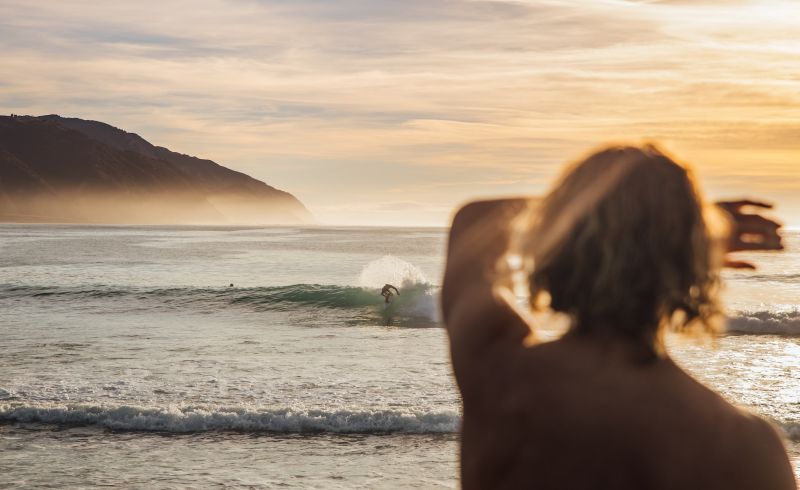Eye Health for Surfers: Avoiding the Dangers of UV Radiation

Outside in the sun, you’re not only exposing your skin to harmful UV rays, you’re also exposing your eyes and potentially impacting your eye health.
Like your skin, your eyes are susceptible to damage from intense sunlight and heat. But if you don’t take precautions before heading outdoors, it can be too late by the time you realise your vision is impaired. In fact, those who spend a lot of time outdoors are more likely to suffer vision loss due to age-related macular degeneration.
Protecting your eyesight is an essential part of maintaining good eye health. UV and outdoor activities like surfing can cause several eye diseases, which may lead to blindness. Wearing sunglasses, broad-brimmed hats, and sunscreen will help reduce your risk of developing any eye disease caused by exposure to UV radiation.
Dangers of UV Radiation for Eye Health
UV radiation is a major cause of eye disease. It can cause cataracts as well as pterygiums, a benign growth of the cornea usually caused by chronic exposure to solar UV radiation. It’s more common in outdoor workers, but it’s also more common during summer when people spend more time outdoors.
Here are some of its dangers:
– UV radiation is a known risk factor in squamous cell carcinoma (cancer of the eye), particularly for fair-skinned people who spend time outdoors in sunny climates.
– UV light induces a thickening, then growth of the conjuctiva on the inside aspect of the white of the eye onto the cornea. It causes irritation, looks unsightly and red and can blur vision by warping the shape of the cornea. They can transform into cancer. A Pterygium can be removed by your eye surgeon, however prevention of their development in the first place is ideal by reducing UV exposure.
– UV light can cause the natural human lens to lose its clarity, causing blurred vision. Cataracts ultimately require surgery to replace the lens.
– UV radiation is cumulative. Most of the UV exposure you get during your lifetime is accumulated in the first 18 years and accounts for 95% of your total lifetime exposure. The most significant period for UV damage to the eye is childhood before age 18, when most people spend a large proportion of their time outdoors.
However, in later life, it may be possible to reduce or prevent further damage by wearing sunglasses with high UV-A protection (UV-A lenses block 99%+ of harmful rays) and wearing hats.
You may not feel the effects of UV exposure immediately, but it’s not just outdoor workers at risk. The invisible damage can be sustained by anyone spending time outside, especially if they’re doing so without protective gear.
Why Surfers Are at Risk
UV radiation is a major concern for surfers.
If you’re a surfer, you know that UV radiation from the sun can put your eye health at risk. But did you know that even the reflection of sunlight off of water can be harmful?
While these risks are essential to keep in mind while surfing, they don’t have to keep you from enjoying the sport!
General Tips to Maintain Your Eye Health
Keeping your eyes healthy is a lot easier when you know how. Here are some tips to keep your eyes safe, whether you’re at home or out in the sun.
– Wear sunglasses when you’re out in the sun. This is a no-brainer—the sun’s rays can damage your eyes and wearing sunglasses will help protect them from damage.
– Look for shade. If you’re in the sun for more than 15 minutes, find shade to protect your eyes from further damage.
– Obviously avoid staring directly into the sun (even if it’s not at its peak), however your eyes can get damaged just as easily from looking at an indirect reflection of water or other surfaces as from direct sunlight.
– Drink plenty of water throughout the day! Staying hydrated can help keep your eyes healthy and reduce the risk of dryness or irritation caused by dehydration (which can lead to more serious problems like cataracts).
– Eat foods rich in Vitamin A. Vitamin A is an important nutrient for good vision and eye health. It can help protect your eyes from age-related macular degeneration, cataracts and other vision problems. Vitamin A is found in meat, fish, dairy and vegetables such as sweet potatoes, carrots and kale.
– Visit your doctor for eye check-ups. Eye check-ups are important for your overall health, and it’s important to have them regularly. Your doctor will be able to spot any changes in your vision and make sure you’re taking care of your eyes. In addition to keeping your vision clear, regular visits can help identify any underlying health conditions that may be affecting your eyesight.
– If possible, when surfing, consider wearing a hat and if available, surfing UV blocking sunglasses or goggles.
Takeaway
The sun can be wonderful, and it’s good for your health. But it’s important to remember that too much sun can damage your eyesight. If you’re going outside this summer, protect your eyes with sunglasses and hats that offer broad-spectrum protection from ultraviolet rays.
Surfers, in particular, must be extra careful when protecting their eyes from the sun’s damaging rays.
Water and sand are two things that can easily get into your eyes when you’re hitting the waves. If you don’t take the proper precautions, this can lead to irritation and infection.
The best way to protect your eyes is by wearing a pair of sunglasses with UV protection when outdoors, taking precautionary measures when surfing such as a hat and sunglasses, and eating foods rich in Vitamin A to maintain good vision.
Take care of your eyes while you are still young to avoid costly visits to the doctor for treatments and medications. You will thank yourself for it later on in life.
Surfing Image by Tim Marshall on Unsplash



